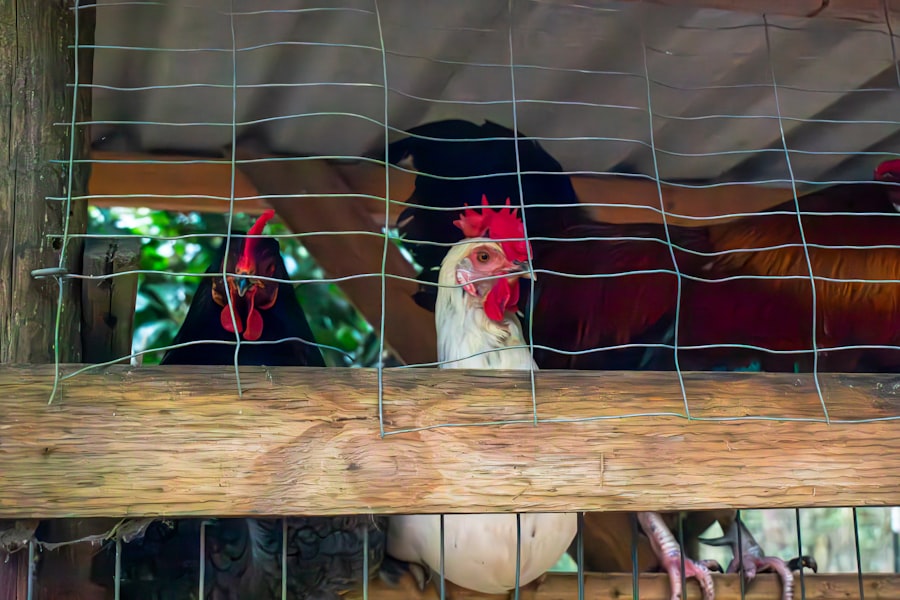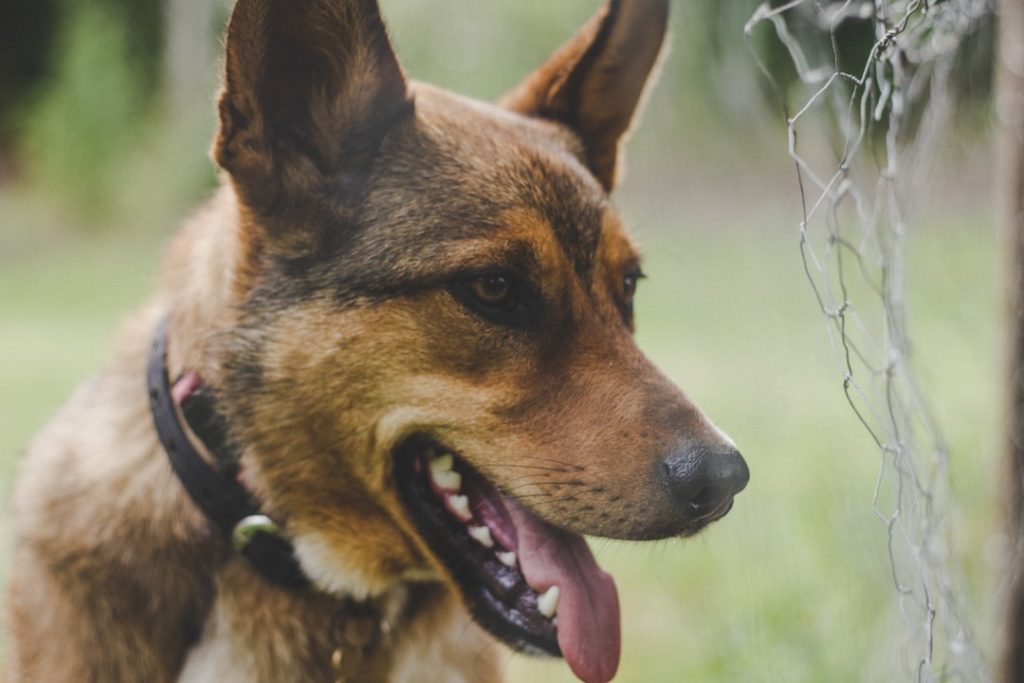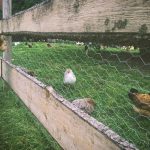Chickens are beneficial animals in gardens, providing eggs, pest control, and fertilizer. However, they can become problematic when they develop a habit of eating flowers. This behavior can be particularly frustrating for gardeners who have invested time and effort into cultivating their flower beds, especially when rare or valuable varieties are affected.
The challenge lies in finding effective methods to protect flowers from chickens without harming the birds. Chickens are attracted to flowers due to their bright colors and appealing scents. Their natural curiosity leads them to investigate and peck at visually interesting objects.
Furthermore, some flowers may contain nutrients that chickens seek, encouraging consumption of the blooms. Balancing the freedom of chickens to roam in the garden with the preservation of flower beds can be challenging. This article will discuss various strategies for preventing chickens from eating flowers while maintaining a harmonious garden environment for both plants and poultry.
Table of Contents
- 1 Understanding the Importance of Flowers in the Garden
- 2 Natural Deterrents to Keep Chickens Away from Flowers
- 3 Creating Physical Barriers to Protect Flowers from Chickens
- 4 Using Scent and Taste to Repel Chickens from Flowers
- 5 Training Chickens to Avoid Eating Flowers
- 6 Maintaining a Beautiful Garden while Keeping Chickens Safe
- 7 FAQs
- 7.1 What are some common home remedies to keep chickens from eating flowers?
- 7.2 Is it safe to use natural deterrents to keep chickens from eating flowers?
- 7.3 What are some chicken-friendly herbs and plants that can be planted to distract chickens from eating flowers?
- 7.4 How effective is using chicken wire or fencing to keep chickens from eating flowers?
- 7.5 Are there any other methods to keep chickens from eating flowers?
Key Takeaways
- Chickens can be a nuisance in the garden by eating flowers, which can be detrimental to the overall aesthetics and health of the garden.
- Flowers play a crucial role in the garden ecosystem by attracting pollinators and beneficial insects, and providing beauty and fragrance.
- Natural deterrents such as planting strong-smelling herbs and flowers, using chicken wire or netting, and creating physical barriers can help keep chickens away from flowers.
- Scent and taste repellents such as citrus peels, garlic, and hot pepper spray can be effective in deterring chickens from eating flowers.
- Training chickens to avoid eating flowers can be achieved through positive reinforcement, distraction, and providing alternative sources of food.
Understanding the Importance of Flowers in the Garden
Here is the rewritten text with 3-4 The Importance of Flowers in the Garden Ecosystem
Flowers play a vital role in maintaining a healthy and thriving garden ecosystem. They attract pollinators such as bees and butterflies, add beauty and color, and contribute to the overall well-being of the garden. Beyond their aesthetic value, flowers also serve practical purposes, including companion planting to deter pests or attract beneficial insects.
The Sentimental Value of Flowers
In addition to their ecological importance, flowers hold sentimental value for many gardeners. They are often carefully chosen and cultivated, and their loss to chicken foraging can be deeply disheartening. Furthermore, some flowers may have cultural or symbolic significance, making their preservation even more meaningful.
The Need to Protect Flowers from Chickens
When chickens consume flowers, they disrupt the delicate balance of the garden ecosystem and can negatively impact the health and productivity of the garden. It is therefore essential to find ways to protect flowers from chickens while still allowing the birds to enjoy the benefits of free-ranging in the garden.
Finding Effective Solutions
By understanding the significance of flowers in the garden, we can better appreciate the need to address the issue of chickens eating flowers and work towards finding effective solutions.
Natural Deterrents to Keep Chickens Away from Flowers

One approach to deterring chickens from eating flowers is to use natural repellents that are safe for both the birds and the garden. Certain plants and herbs have scents or tastes that chickens find unpleasant, making them effective deterrents. For example, planting strong-smelling herbs like lavender, mint, or rosemary around flower beds can help keep chickens at bay.
These plants not only add beauty and fragrance to the garden but also serve as a natural barrier against chicken intrusion. Another natural deterrent is the use of certain flowers that repel chickens due to their taste or smell. Marigolds, for instance, are known to have a strong odor that chickens find unappealing.
Planting marigolds around vulnerable flower beds can help protect them from chicken foraging. Additionally, incorporating plants with prickly or spiky foliage, such as thorny bushes or ornamental grasses, can create physical barriers that deter chickens from accessing the flowers. By utilizing natural deterrents, gardeners can protect their flowers from chicken damage without resorting to harmful chemicals or methods.
This approach not only preserves the integrity of the garden but also promotes a healthy and sustainable environment for both plants and animals.
Creating Physical Barriers to Protect Flowers from Chickens
In addition to natural deterrents, creating physical barriers is an effective way to prevent chickens from accessing flower beds. This can be achieved through various means, such as installing fencing or using cloches and netting. Chicken wire or hardware cloth can be used to create low fences around flower beds, providing a simple yet effective barrier against chicken intrusion.
These barriers should be tall enough to prevent chickens from reaching over them and sturdy enough to withstand any attempts at digging or pushing through. Cloches and netting can also be used to protect individual plants or small flower beds from chicken damage. Cloches are transparent covers that can be placed over individual plants to shield them from chicken pecking while still allowing sunlight and water to reach the plants.
Netting can be draped over larger areas to create a physical barrier that prevents chickens from accessing the flowers. These methods are particularly useful for protecting newly planted or vulnerable flowers until they become established and less appealing to chickens. When implementing physical barriers, it is important to ensure that they are secure and well-maintained to effectively keep chickens away from the flowers.
Additionally, consideration should be given to the aesthetics of the barriers to ensure they complement the overall design of the garden.
Using Scent and Taste to Repel Chickens from Flowers
Another approach to deterring chickens from eating flowers is to use scent and taste repellents that make the flowers unappealing to the birds. There are various natural substances that can be used to create sprays or solutions that deter chickens without causing harm. For example, mixing hot pepper sauce with water and spraying it on the flowers can make them less palatable to chickens due to the spicy taste.
Similarly, creating a solution with garlic or vinegar can produce a strong odor that repels chickens from pecking at the flowers. In addition to homemade repellents, there are commercial products available that utilize natural scents and tastes to deter chickens from flower beds. These products are often made with non-toxic ingredients and can be safely applied to flowers without causing harm to the plants or the chickens.
By using scent and taste repellents, gardeners can protect their flowers from chicken damage while avoiding the use of harsh chemicals or harmful substances. It is important to note that when using scent and taste repellents, regular reapplication may be necessary, especially after rainfall or watering. Additionally, care should be taken to avoid direct contact with the flowers themselves to prevent any adverse effects on their appearance or fragrance.
Training Chickens to Avoid Eating Flowers

Intelligent Animals, Capable of Learning
Chickens are intelligent animals that can learn and respond to positive reinforcement. By using training techniques such as positive reinforcement with treats or distractions, gardeners can teach their chickens to avoid certain areas or behaviors, preserving their flower beds while allowing the birds to roam freely in the garden.
Distraction and Redirection
One effective method of training chickens is through distraction and redirection. By providing alternative sources of food or entertainment in designated areas of the garden, chickens can be encouraged to focus their attention away from the flower beds. This can include setting up designated feeding areas with scratch or treats, as well as providing enrichment activities such as dust baths or foraging opportunities.
Positive Reinforcement for Desired Behaviors
Positive reinforcement can also be used to train chickens to avoid eating flowers by rewarding desired behaviors with treats or praise. When chickens show interest in something other than the flowers, such as scratching in a designated area or pecking at a specific object, they can be rewarded with treats or verbal praise. Over time, this positive reinforcement can help condition the chickens to associate certain areas or behaviors with rewards, leading them to avoid eating flowers.
By training chickens to avoid eating flowers, gardeners can create a harmonious coexistence between their feathered friends and their beloved flower beds. This approach not only protects the flowers from damage but also fosters a positive relationship between humans and animals in the garden.
Maintaining a Beautiful Garden while Keeping Chickens Safe
In conclusion, finding ways to protect flowers from chickens while maintaining a beautiful garden is a common challenge for many gardeners. By understanding the importance of flowers in the garden ecosystem and recognizing the significance of preserving them, we can appreciate the need for effective solutions to deter chickens from eating flowers. Natural deterrents such as plants with strong scents or tastes, as well as physical barriers like fencing and netting, offer safe and sustainable methods for protecting flower beds from chicken damage.
Additionally, using scent and taste repellents and training techniques can help create a harmonious environment where chickens can coexist with flowers without causing harm. By implementing these methods thoughtfully and consistently, gardeners can enjoy the benefits of having chickens in their garden while safeguarding their precious flowers. Ultimately, by finding ways to protect flowers from chickens, we can create a thriving and beautiful garden that is enjoyed by both humans and animals alike.
If you’re looking for more tips on keeping chickens and other poultry, check out this article on keeping guinea fowl and chickens together. It offers valuable insights on cohabitating different types of poultry and may provide additional solutions for keeping chickens from eating your flowers.
FAQs
What are some common home remedies to keep chickens from eating flowers?
Some common home remedies to keep chickens from eating flowers include using chicken wire or fencing to create a barrier around the flower beds, using natural deterrents such as citrus peels, coffee grounds, or cayenne pepper around the flowers, and planting chicken-friendly herbs and plants as a distraction.
Is it safe to use natural deterrents to keep chickens from eating flowers?
Yes, using natural deterrents such as citrus peels, coffee grounds, or cayenne pepper is safe for chickens. These natural substances are not harmful to chickens and can effectively deter them from eating the flowers.
What are some chicken-friendly herbs and plants that can be planted to distract chickens from eating flowers?
Some chicken-friendly herbs and plants that can be planted to distract chickens from eating flowers include mint, oregano, thyme, and lavender. These plants not only provide a distraction for the chickens but also offer additional benefits such as insect repellent properties.
How effective is using chicken wire or fencing to keep chickens from eating flowers?
Using chicken wire or fencing to create a barrier around the flower beds is a highly effective method to keep chickens from eating flowers. It physically prevents the chickens from accessing the flowers and can be a long-term solution for protecting the plants.
Are there any other methods to keep chickens from eating flowers?
In addition to using natural deterrents, planting chicken-friendly herbs, and using chicken wire or fencing, other methods to keep chickens from eating flowers include providing alternative sources of entertainment and foraging for the chickens, such as hanging treats or providing a designated area for them to peck and scratch.
Meet Walter, the feathered-friend fanatic of Florida! Nestled in the sunshine state, Walter struts through life with his feathered companions, clucking his way to happiness. With a coop that’s fancier than a five-star hotel, he’s the Don Juan of the chicken world. When he’s not teaching his hens to do the cha-cha, you’ll find him in a heated debate with his prized rooster, Sir Clucks-a-Lot. Walter’s poultry passion is no yolk; he’s the sunny-side-up guy you never knew you needed in your flock of friends!







